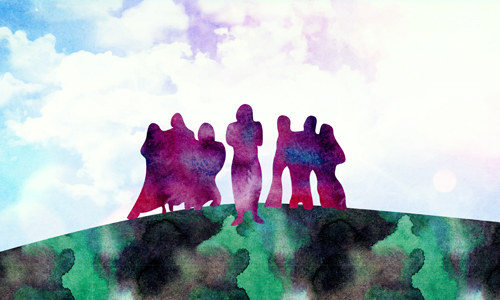
But please consider this: You often boast with pride about Jewish contributions to the world. You take pride in Einstein, Freud, Houdini, and countless others whose names are engraved in history. You clearly identify with Jewish pain and often scan the headlines for Jewish and Israeli names. You worry about the safety of Israel and sympathize with its citizens because many of your relatives live there. You take pride in discussing your grandparents’ Yiddish fluency and smile at the memories of your grandmother’s cooking. You live up to your family values by investing in your education, being strongly committed to the arts, and, of course, nurturing a deep connection with your Jewish mother.
This is what it means to be a Jew: wonderful memories, intellectual accomplishments, and family ties. But shouldn’t we acknowledge that these aren’t just randomly shared values? These are the cornerstones of the Jewish foundation, transmitted to our nation by Moses himself when we collectively agreed to become the “chosen” people—chosen, in fact, by G‑d, Himself—and to live in accordance with that commitment.
Today, you and I are products of this decision. No one knows how we’ve been able to survive for 2,000 years, scattered among the nations of the world. Yet today there is an undeniable connection between the Jewish people, regardless of their language, background or social status. We are the only nation with one collective destiny.
What kept us together, separate, “chosen” for more than 2,000 years?
The answer lies in one word: Torah. The Torah—our manual—taught us how to live a life of connection and purpose. It is full of commandments that bind us to our Creator and each other. It teaches us about absolute values of compassion, dedication, morality, justice, human dignity, and uncompromised integrity.
The values that we are all so proud of today come from our Torah. In order to uphold these eternal principles, we need to know their source and be able to go back to their roots.
Many brave people have risked their lives to uphold our G‑d-given commandments. At times, these selfless and deeply committed people were an absolute minority, yet they took upon themselves to preserve and transmit the traditions of our fathers. Persecuted, abused and mocked, they remained uncompromising. It is to these humble heroes of Jewish history that we owe tremendous gratitude.
As a child born in the Soviet Union, I remember my struggle with Jewish identity and the pain of anti-Semitism we faced for attempting to be or do anything Jewish.
So why don’t these heroic acts move us today? Perhaps it is easier to admire grandiose gestures from afar, rather than make small insignificant steps in our personal lives.
Despite the fact that we no longer need to risk our lives to uphold Jewish traditions, many of us simply walk away from the source of our binding truth and values. We walk away from the Torah, as if it is no longer relevant or applicable.
Do we scoff at old-fashioned traditions and think we’ve outgrown them? Is that fair? The only reason we survived is because of the meticulous observance of our Jewish way of life! Connecting our lives to Torah is the only way to ensure that our children will identify with and celebrate their Jewish heritage.
Now I get to the personal and rather painful part of this letter. You see, as you light Chanukah candles or read about heroes of modern times—such as the Soviet Jews who attempted to hijack a plane to escape from the former Soviet Union to Israel (“Operation Wedding,” June 15, 1970)—you feel pride and admiration.
These were dedicated people who withstood pogroms, persecution, inquisition, crusades, anti-Semitism, communism and all other calamities during Jewish history and still remained committed to the Jewish way of life. It is this type of persistence that assured our survival as a nation throughout history.
But when someone in your life is trying to uphold a kosher diet, keep Shabbat or fulfill any other Jewish commandment from the Torah, your initial reaction is to criticize or dismiss them.
Such commitment deserves respect. Yes, it can be difficult and inconvenient, and the person making those changes should be polite and respectful. Yet the things that are important and truly meaningful in life require certain sacrifices.
So if you have people in your life who have “become religious” (or rather, “returned to the values of the Jewish people”), please don’t mock them, but instead learn with them. See them as the shamash of the Chanukah menorah, the flame which lights the other candles. Let them be a source of inspiration, your personal light in your spiritual journey.
As we embrace our Jewish identity, let’s remember that we are a living autograph of the brave and humble heroes who fought for our survival, such as Queen Esther or King David. G‑d put a stubborn courage in their hearts so that they would not fear or surrender. As descendants of these brave heroes, we have the courage to stand up for G‑d, for our people, and for our heritage.
Don’t be afraid. Hundreds of generations before you lived their lives with you in mind, so that you can be a Jew today.
You are a link in the chain of the Jewish collective story. Your heritage is not “his story;” it’s “your story.” Don’t surrender; add your link to the eternal chain of your people.
Published on https://www.chabad.org/theJewishWoman/article_cdo/aid/4464593/jewish/A-Letter-to-the-Family-Members-of-Those-Who-Returned-to-a-Torah-Way-of-Life.htm
